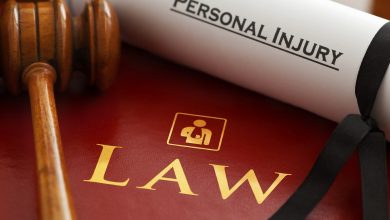Know Your Rights at a Traffic Stop

We all know that drop in your stomach when you see blue and red lights flashing and start to hear a siren. In the moment, it’s easy to get caught up in the nervousness of the situation, but it’s important to be aware of your rights to ensure that they aren’t being violated and to keep you safe and out of handcuffs.
The first thing to note is that they must have probable cause to pull you over. You must have violated some kind of traffic rule or shown illegal behavior in some way, and you are more than welcome to ask the officer to define the reason why he stopped you. If there is no valid reason, then the traffic stop may be deemed unlawful. A point where this isn’t applicable is a checkpoint, as this requires all vehicles to be stopped.
You can pull off to a safe location.
You don’t want to stop in an unsafe location, as this isn’t ideal for you or the police officer. Driving too far will look like you’re trying to escape, but there isn’t a problem with you turning on your hazards, slowing down, moving to the far right lane, and getting off at the closest exit. Especially if it’s dark, you want to be sure that you will be safe. Just be sure that your actions show that you have acknowledged them trying to pull you over, and you are simply traveling to a safe place to stop.
You have the right to remain silent.
This is the right that people are the most familiar with after hearing the famous arresting speech in all their crime shows: “You have the right to remain silent. Anything you say can and will be held against you in a court of law. You have the right to an attorney…” But do you know the extent to which this covers you?
Known as the Fifth Amendment, this right is intended to be a protection for those who have not been charged with a crime. You have no obligation to tell police anything up until that point.
Your Miranda Rights are what explicitly give you this right. It’s mostly about allowing you to not incriminate yourself in questioning.
Just refusing to say anything probably isn’t going to get you the best results. When they ask you questions about your license, registration, and other key identification items, you’re obligated to give it to them. You really don’t need to communicate with them past this point if you don’t want to. If you have a genuine excuse for your speeding, broken tail light, expired registration, or any other reason you got pulled over, you’re probably going to see better results if you calmly explain your reasons.
However, if you’re worried about giving something away that may get you in trouble or talking yourself into a hole, you can feel free to inform the police officer that you’re invoking your right to remain silent. It’s best to make that clear to the officer, especially because it lets them know that you’re aware of your rights and what they can and cannot do to you. It will also allow the officer to know you aren’t just ignoring them to be belligerent.
There are a few aspects you need to be aware of:
- You must explicitly state your intention of pleading the Fifth Amendment.
- This can make you look guilty. If you’re refusing to answer questions, the officer may become suspicious. One way to avoid this is telling the officer that your attorney has advised you to remain quiet.
- Depending on your state, it’s possible that you can’t have the fact that you expressed your Miranda rights used against you. An inference of guilt cannot be made based on the fact that you aren’t speaking.
Feel free to record the interaction.
You are absolutely allowed to film when you are approached by police. Most of them wear body cameras now, but you are also allowed to use filming to hold them responsible if you feel the need. Be sure that you’re still cooperating as far as providing documents or cooperating if an arrest is going to be made, but having a copy of what happened can be incredibly helpful, especially if the officer commits some wrongdoing that you now have proof of. Additionally, this may encourage all involved to behave a little better if they know their moves are on camera. As long as this doesn’t become a problem as far as you cooperating once you absolutely have to, this is completely within your rights.
You technically don’t have to consent to a breathalyzer test.
However, if you refuse and are found to be under the influence while driving, the consequences are going to be much worse for you. Once they make the charge, they will be able to use your refusal as further proof that you were intoxicated. If they don’t have probable cause, you can feel free to refuse. As long as there isn’t a warrant, you don’t have to do anything.
There are cases where you can’t refuse, however. As mentioned above, if they have a warrant, you have to take the breathalyzer test. Be aware that they can also obtain a warrant on the spot if they have probable cause. This will make things much worse for you if you are intoxicated because it will appear that you were aware that you couldn’t pass a test while driving. Additionally, if your state is enforcing their no-refusal policy, you also cannot refuse. Some states seem to do this on weekends and holidays, or any other time they think there may be a high chance of drunk driving. Finally, you may live in a state where there is implied consent, meaning that as long as you have a driver’s license, you gave your consent already to be tested. Read up on your specific state’s policy if you’re particularly concerned, but it’s probably best to just drive sober.
You can refuse to allow them to search your car, your belongings, or yourself without a warrant.
This is where your Fourth Amendment comes in handy. This one protects you from unjust searches or seizures. Last revised in 1992, the Fourth Amendment assures, “the right of the people to be secure in their persons, houses, papers, and effects, against unreasonable searches and seizures, shall not be violated, and no Warrants shall issue, but upon probable cause, supported by Oath or affirmation, and particularly describing the place to be searched, and the persons or things to be seized.”
Warrants
A warrant, simply put, is just a judge signing off on an order that the police have the right to search for certain items at a clearly defined location. Searches cannot occur without this warrant or in areas not directly addressed by the warrant.
In order to obtain a warrant, they must provide probable cause as outlined, usually by informing the judge of the circumstances and why they believe there is a reason to search the vehicle. It can include testimony from other citizens that may have witnessed the incident or seen the illegal items. This is under oath, so they cannot make up reasons, and if they don’t have solid proof, it’s likely the warrant will be denied.
This may also involve searching your person; it isn’t just limited to your vehicle or property. But again, only allow these searches to occur if a warrant is present, especially if you’re worried in the slightest of what they may find. While they must only be searching for the items described in the warrant, if they come across other unlawful property while looking, you can be charged with possession of those items as well.
Probable Cause
Without a warrant, police cannot force you to allow a search. This is another case where if they can procure probable cause, then they can get a warrant and then search you. When there is not probable cause, however, you are able to refuse. It’s helpful to explicitly ask the officer if they have any probable cause, and if so, what it is. If they tell you they don’t have any real instance of cause to search, then obtaining a warrant will be nearly impossible, and you’re probably safe refusing.
It’s important to note that there is something called the Plain View Doctrine, which basically outlines law enforcement’s right to take any illegal property if it’s in plain view. For example, if you have a bag of marijuana on your dashboard, easily in the view of a police officer, it’s likely you will be arrested for drug possession. However, if it’s in a container, even if it’s in the officer’s sight, it’s not likely that they’ll be able to charge you. This also applies to pat-downs, so if an officer feels a weapon while searching your person, this also does not require a warrant in order to make an arrest if necessary.
Consenting to a Search
If you feel confident that you don’t have anything to worry about with a search, then you should still be aware of your rights that accompany your consent. For one, you can explicitly state what they can and cannot search without your permission.
The law places the burden of proof on the prosecution to proof that you actually consented here. There may also be instances where you can prove that a consent to a search was coerced; however, it is not relevant whether you were made aware of your right to deny the search.
There can also be discussion on who gave consent, but this is more applicable to home searches where someone like a roommate could be the one that provided consent. The authority that a third-party holds when consenting to a search has been limited if the suspect is present, which is more likely during a traffic stop.
Emergency Exception
This basically gives law enforcement the right to enter a property if there are circumstances that require it, such as someone being harmed, evidence of illegal property being disposed of, if a suspect was fleeing, or if there was danger involved. The criteria basically comes down to whether the police officer would find it unsafe or impractical to wait for a search warrant. These still have to hold up in court though, so if it isn’t a valid reason, the evidence found still can’t be used.
The Supreme Court case that defined this exception greatly, Missouri v. McNeely (2013), explains this kind of a circumstance to be one where, “law enforcement’s need to provide emergency assistance to an occupant of a home . . . engage in “hot pursuit” of a fleeing suspect . . . or enter a burning building to put out a fire and investigate its cause.”
If these Rights are Violated
If they search your vehicle anyways and you are charged with a crime, the officer will have to provide sufficient reasoning for their search without a warrant. Once, or if, a warrant is obtained, it’s important to cooperate and allow them to search your items.
The general idea is that, if a search occurs without your consent, all evidence found cannot be used in a court of law. So even if they did find illegal substances on you, if they take you to court, they cannot use that as evidence, which may make it harder to form a case against you.
Overall, a lot of attorneys suggest never allowing a search of your items, simply because it is your right to and you may never know what they may find, whether you were aware of it or not. If you really feel you have nothing to hide and have the time, then it’s not a bad thing. However, legal advice is more along the lines of “better safe than sorry.”
If they aren’t charging you with something, you have the right to leave.
If you find yourself stuck in a police interaction that doesn’t seem to be going anywhere, it’s in your rights to leave. You need to first ask the officer if they plan on charging you with anything or detaining you if they continue questioning you, especially if you have somewhere to be. It’s probably best to inform them that, if they’re not going to charge or detain you, you have an appointment to make and would like to be on your way if they have no more right to your time. Being patient will be in your best interest when it comes to avoiding tickets and other small charges, but you don’t want to allow the police to abuse your time, as you have a right to being free if you’re not in their custody and have already complied with their document requests.
You have the right to a lawyer.
This is absolutely always your right. If you feel things are getting out of control and you would benefit from having an attorney present, feel free to refuse to go any further without them present. When there’s obvious evidence against you, they may have to meet you at the police station, but you can always insist that you have an attorney before saying or doing anything, especially if you fear you may somehow incriminate yourself.
You still have rights if an arrest is made.
One thing to point out is that, if an arrest occurs, this usually gives law enforcement the right to search your vehicle. They’re typically explicitly looking for evidence that applies to the traffic stop or arrest, any weapons, or other illegal possessions. They must still be able to prove that they made the search because they believed you may have access to the car before a search can be made or that they can find evidence directly related to the reason for arrest.
You still retain your Miranda Rights, and it’s probably even more important to implement those now. You’re probably also going to want to call your attorney at this point or inform them that you would like to speak with the court-appointed lawyer. They then have several hours to book you until your lawyer can file a writ of habeas corpus informing police that they must take you to court to show they have a valid reason for detaining you. Following that, they have 72 hours to charge you with a crime.
While these are your rights, it’s usually best to just cooperate with police and remain calm and polite, especially if you have nothing to hide. Never feel obligated to allow an officer to search your car without probable cause and don’t say anything if you fear it may make you look guilty. It’s better to wait for an attorney to come than to say something you didn’t mean to say and have to face the legal system. However, respect and courtesy can hopefully go a long way.



